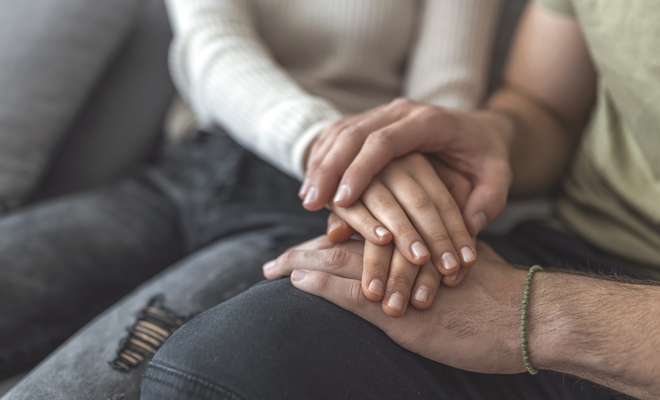Grief is the journey we begin, emotionally, when we have to face a significant loss in our lives. Facing the reality of a loss is a painful situation, whether in a breakup situation, due to the death of a loved one…
In the case of death, in addition, we must face the challenge of understanding that this person is no longer in the physical space that is that of the earth, but is in the emotional field, in the memories and in the footprint that has left in us, with our way of being, of looking, of living.
In a process of this type, it is normal for us to experience conflicting feelings, and sometimes we even have the feeling that we have lost our minds. Frequently asked questions appear: is this normal that I feel? And what is happening to me? But what is normal really? It is clear that for each person, the meaning of “normal” will differ, and in Daario Feminine we are going to talk to you about emotions or situations that occur during grief and that are very normal.
Emotions that are completely normal in the grieving process
Yes, it is normal to feel “abnormal” things in grief. But we already anticipate that the answer is yes, which is normal; probably everything you are experiencing in a grieving process, and if the grieving does not become pathological, it is totally normal. And here we understand “normal” as natural, lawful, consistent with the situation of loss, valid, undeniable.
Put the adjective you prefer; but remember, regardless of whether that’s “normal” or not, if you feel that way, it’s okay, even if it hurts a lot sometimes. In this article we talk about things that happen in grief that are normal, although sometimes we don’t believe it, and why they appear. We focus on the things that can shock us in the first instance but which, we insist, are normal and, therefore, deserve to be accepted and validated.
Feeling the presence of that person is normal in mourning
- A very normal thing in mourning is to feel the presence of that person who is no longer there (especially at the beginning of the duel, although we can also experience this feeling years later). We can feel that this person is close, next to us, that he surrounds us, that he speaks to us or even that he protects us. This happens especially with people who have been very important on our way, who believed in us and who connected us with the best of each other. Also, with those people with whom we felt calm and safe.
- And it is that when grief occurs, when the reality of facing that loss is already unavoidable, we often feel the sensation of being out in the open. And in that weather, the need is formed in our mind, both physical and mental, to continue feeling (or seeing) that person.
- That person who protects us from so much pain and uncertainty, from emotions on the surface and from the undeniable intensity of suffering. According to Maria Ramos, a therapist specialized in grief, it is possible to feel and listen to our deceased loved ones, and also, their messages are important, because they help us to know who we are (and who we have been together with them). And it is that there are things that death cannot touch, such as connections, the presence of the other and love beyond time and death itself.
Feeling euphoria in the grieving process is normal
- Feeling euphoria is also normal in a grieving process. It shocks us and surprises us because these moments of euphoria can destabilize us. These are difficult moments to manage, since euphoria is not “feeling joy”, it is feeling an emotional intensity that overflows, feeling that we lose control of our emotions, feeling hyperactive, nervous or acting with great impulsiveness.
- For example: laughing in inappropriate situations, or thinking very fast. Need the risk, look for the most intense sensations. These “highs” are nothing more than our self-regulating emotions; sometimes it can even be a way that our mind has to isolate itself from pain, to flee from it.
- They are phases that come and go, since grief is not a linear process, but with time and the acceptance of the loss, they are spaced out until they disappear.
Being afraid of the future, a natural symptom in mourning
Being afraid of what will come is also a natural symptom in mourning. And it is that our mind is activated in alert mode, fearing to relive what has already made us (and is making us) suffer. The fact of losing someone we love (especially if it is abrupt) leads us to understand that bad things can happen to anyone, and at any time.
And from there is born that fear of the future: fear of the bad that may come, fear of the new, of the unknown. But remember, all emotions have a function; Embrace that fear, tell it you understand, and make room for it to leave when you’re ready to.
Becoming more impatient and/or irritable is very common in grief
- Another thing that happens in grief that is normal is the fact of having less patience. This happens, many times, due to the physical and mental exhaustion that the grieving process itself leaves us. Thus, without that energy that we did have before, it is difficult to manage certain situations calmly and patiently, because we are at the limit, and things also no longer affect us.
- And the same goes for irritability; Clearly things affect us more, because, as we said, we are more sensitive. So, if you notice that you lose your patience more easily, and you feel more irritable, think that it is something totally normal in your situation.
Feeling exhausted is normal during the grieving stage
- In line with what has been said, feeling exhausted, both physically and mentally, is also another of the things that occur in mourning that is normal. Think that right now, all your resources (physical, cognitive and emotional) are destined to try to face this situation of painful loss.
- You are trying to put yourself together, adapt to a new reality without that person. Of course you’re exhausted! That is why it is so important that you do not demand more of yourself, that you accept your moment of vulnerability and, above all, that you take good care of yourself (sleeping habits, eating…), even if it is hard for you to do so right now. You deserve to be taken care of.
How to deal with emotions or situations that occur during mourning?
We know that each situation and person is different, and that each of the things mentioned (and others) will require a series of concrete actions. On the other hand, remember that you know yourself better than anyone, and that you will learn along the way what you need; And if you don’t want to walk this path alone, or if the situation overwhelms you, above all: ask for help!
- Both family and friends and mental health professionals. Despite all this, and knowing that each situation is unique, we can talk about some general ideas that can help anyone who is going through a grieving process:
- Accept all these things you don’t understand (maybe the answers will come later).
- Respect your rhythms and the moments in which you need solitude.
- Surround yourself with people who contribute to you, avoid isolating yourself all the time.
- Validate your emotions.
- Take care of yourself (try to rest, take care of your diet…).
- Don’t push yourself too hard; maybe it’s not the time to do it.
- Play sports when you feel capable, or at least try to go for a walk (nature can comfort us in these cases).
- And last but not least: ask for help if you feel you need it.
